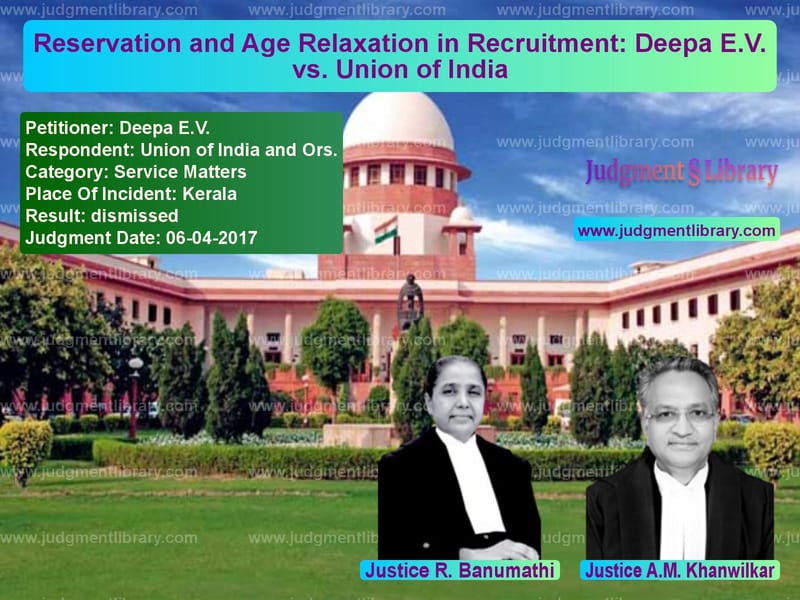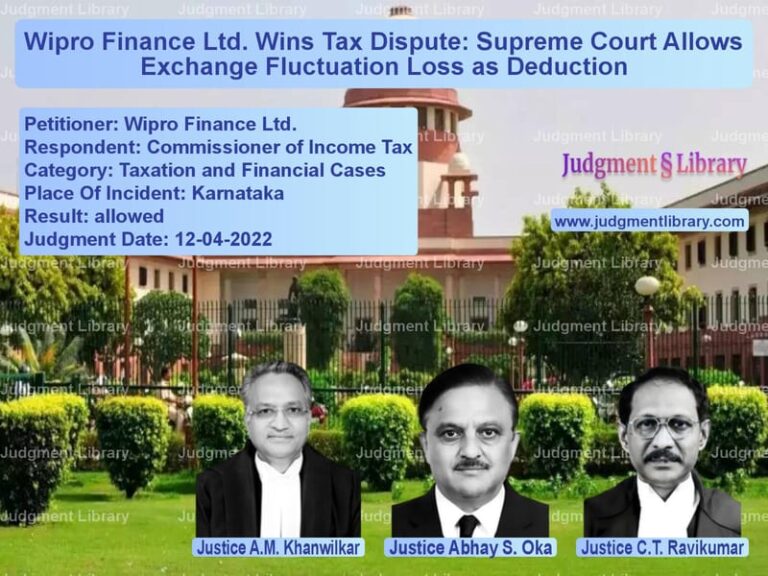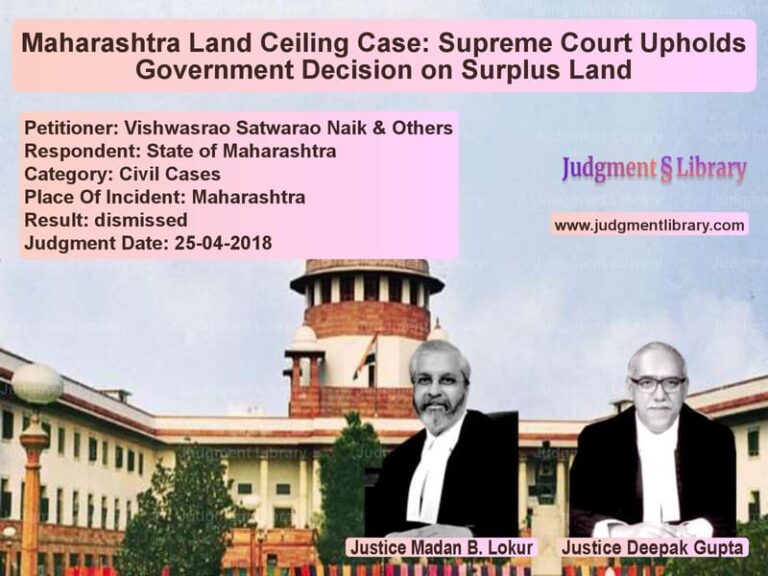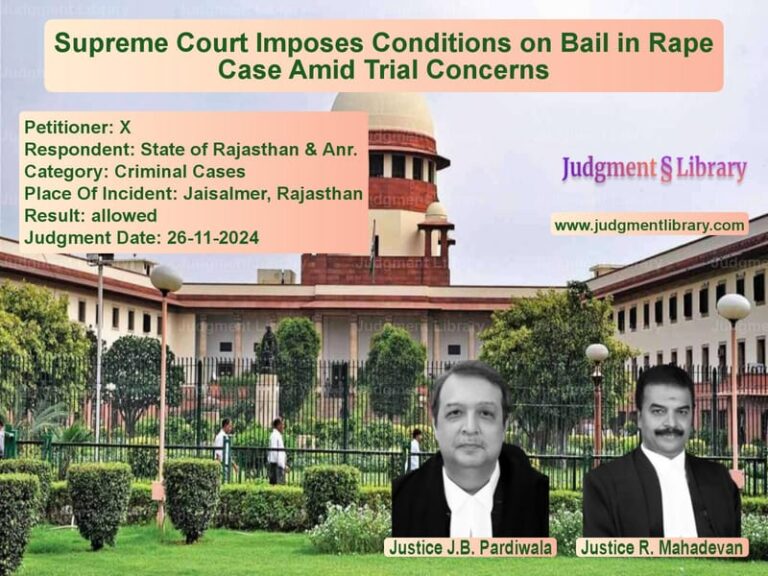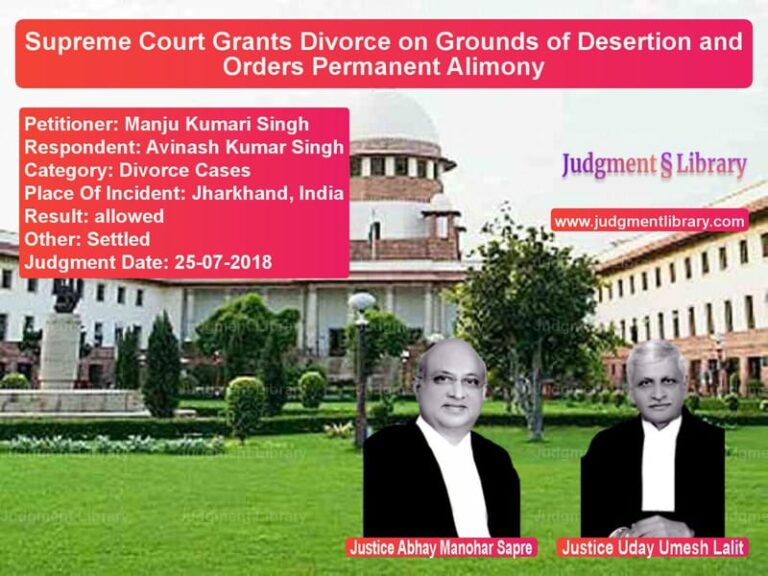Reservation and Age Relaxation in Recruitment: Deepa E.V. vs. Union of India
The case of Deepa E.V. vs. Union of India highlights the legal position on whether candidates belonging to the Other Backward Classes (OBC) who avail of age relaxation can claim seats in the General Category. The Supreme Court examined whether an OBC candidate, who had applied under the reserved category and availed relaxation, could later be considered for appointment under the General Category.
Background of the Case
The appellant, Deepa E.V., applied for the post of Laboratory Assistant Grade II in the Export Inspection Council of India under the Ministry of Commerce and Industry. She belonged to the Dheevara community, recognized as an OBC, and availed age relaxation as per the rules applicable to OBC candidates.
During recruitment, she was one of the eleven OBC candidates called for an interview. She secured 82 marks, but another OBC candidate, Serena Joseph, scored 93 marks and was selected for the post. The General Category vacancies, requiring a minimum cut-off of 70 marks, remained unfilled due to the lack of eligible candidates.
Legal Challenge
Deepa E.V. filed a writ petition before the Kerala High Court, arguing that she should be accommodated in the General Category since no candidate met the minimum cut-off criteria for that category. The Single Judge dismissed her petition, leading her to file a writ appeal before the Division Bench, which also ruled against her.
Key Legal Issues
- Whether an OBC candidate who applied under the reserved category and availed age relaxation can later claim a seat under the General Category.
- Interpretation of Rule 9 of the Export Inspection Agency (Recruitment) Rules, 1980, regarding relaxation and reservations.
- Whether the principles laid down in Jitendra Kumar Singh & Anr. vs. State of Uttar Pradesh (2010) apply to this case.
Arguments by the Appellant
Deepa E.V. contended that since the General Category vacancies remained unfilled, she should be considered on merit, as she had scored above the minimum cut-off for the General Category. She relied on the Supreme Court ruling in Jitendra Kumar Singh, arguing that reservation benefits should serve as a “level playing field” rather than restrict opportunities for meritorious candidates.
Arguments by the Respondents
The Union of India, represented by counsel, argued that recruitment rules explicitly barred OBC candidates who had availed relaxation from being considered for General Category seats. They cited the Department of Personnel and Training (DoPT) instructions:
“When a relaxed standard is applied in selecting an SC/ST/OBC candidate, for example in the age-limit, experience, qualification, permitted number of chances in written examination, extended zone of consideration larger than what is provided for general category candidates, etc., the SC/ST/OBC candidates are to be counted against reserved vacancies. Such candidates would be deemed as unavailable for consideration against unreserved vacancies.”
Supreme Court’s Judgment
The Supreme Court upheld the High Court’s ruling and dismissed the appeal. The Court emphasized that recruitment rules and government orders expressly barred candidates who availed of relaxation from being considered under the General Category.
The Court observed:
“On a combined reading of Rule 9 of the Export Inspection Agency (Recruitment) Rules, 1980, and the proceedings dated 1.7.1998, we find that there is an express bar for the candidates belonging to SC/ST/OBC who have availed relaxation for being considered for General Category candidates.”
The Court distinguished this case from Jitendra Kumar Singh, noting that the Uttar Pradesh reservation law considered relaxation as a means to level the playing field. In contrast, the 1998 Central Government instructions explicitly prohibited candidates who availed of relaxation from shifting to the General Category.
Key Legal Takeaways
- SC/ST/OBC candidates who avail of any relaxation in recruitment (such as age, qualification, or experience) cannot later be considered for General Category vacancies.
- Government recruitment rules and DoPT orders must be strictly followed in reservation policies.
- The decision in Jitendra Kumar Singh does not universally apply to all cases of reservation, as different rules govern different recruitment processes.
- Courts will uphold government instructions that explicitly define eligibility criteria for reserved and unreserved categories.
Conclusion
The Supreme Court’s ruling reinforces the principle that candidates must adhere to the category under which they apply. If an OBC candidate avails of relaxation benefits, they must compete only within the reserved category and cannot later claim unreserved vacancies. This judgment serves as a precedent for future disputes on reservation policies and eligibility in public sector recruitment.
Don’t miss out on the full details! Download the complete judgment in PDF format below and gain valuable insights instantly!
Download Judgment: Deepa E.V. vs Union of India and O Supreme Court of India Judgment Dated 06-04-2017.pdf
Direct Downlaod Judgment: Direct downlaod this Judgment
See all petitions in Recruitment Policies
See all petitions in Public Sector Employees
See all petitions in Employment Disputes
See all petitions in Judgment by R. Banumathi
See all petitions in Judgment by A M Khanwilkar
See all petitions in dismissed
See all petitions in supreme court of India judgments April 2017
See all petitions in 2017 judgments
See all posts in Service Matters Category
See all allowed petitions in Service Matters Category
See all Dismissed petitions in Service Matters Category
See all partially allowed petitions in Service Matters Category

